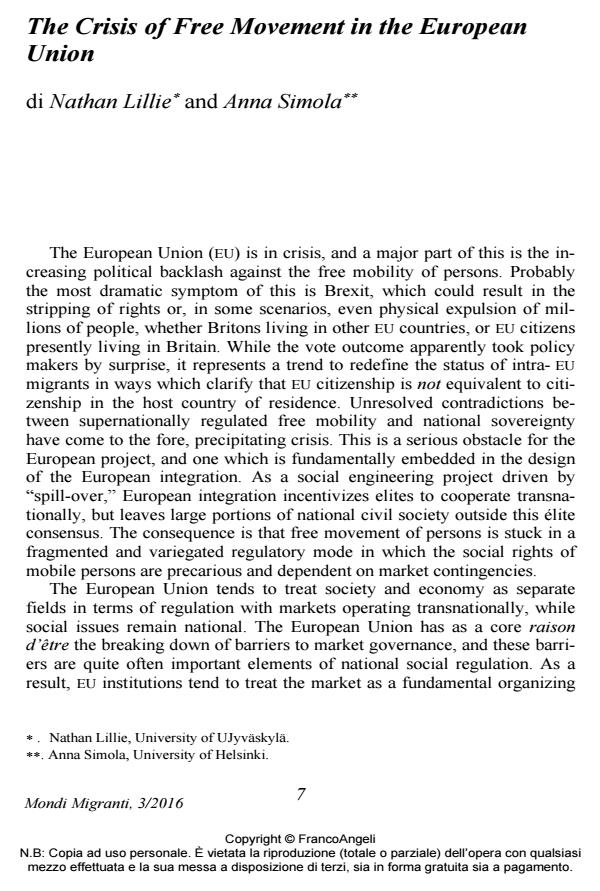The Crisis of Free Movement in the European Union
Journal title MONDI MIGRANTI
Author/s Nathan Lillie, Anna Simola
Publishing Year 2017 Issue 2016/3
Language English Pages 14 P. 7-19 File size 198 KB
DOI 10.3280/MM2016-003001
DOI is like a bar code for intellectual property: to have more infomation
click here
Below, you can see the article first page
If you want to buy this article in PDF format, you can do it, following the instructions to buy download credits

FrancoAngeli is member of Publishers International Linking Association, Inc (PILA), a not-for-profit association which run the CrossRef service enabling links to and from online scholarly content.
This article makes the case that the institutional construction of the EU integration process has furthered the cause of free movement, but is producing a backlash against the free mobility of persons because of its mechanistic dynamics. The backlash against free movement is manifesting in constraints on the social rights of mobile EU citizens, producing precarity. Because the EU has large numbers of people moving all the time, limiting their citizenship access means creating a vast underclass. People are able to move from place to place to work, but have different access to social rights depending on the value of their labour on the market, and on their relationship to the territory they are in. Their lack of rights makes them more desperate, so they accept less, which in turn worsens the labour market conditions for all workers. Greater limits on social citizenship rights, worsens the problem it intends to solve because it recommodifies the labour of those caught outside the charmed circle of social citizenship.
Keywords: Free movement, European integration, labour migration, European social rights, social citizenship, European Union citizenship.
- EU migrant workers and the right to health in the Netherlands during and beyond the COVID-19 pandemic Sandra Mantu, Lisa Berntsen, Tesseltje de Lange, Anita Böcker, Natalia Skowronek, in Transfer: European Review of Labour and Research /2025 pp.105
DOI: 10.1177/10242589251318693 - Free mobility, locked rights: the posting of construction workers from Portugal Joana Marques, Luísa Veloso, Catarina Sales Oliveira, in Mobilities /2021 pp.404
DOI: 10.1080/17450101.2020.1863552 - Before Landing: How Do New European Emigrants Prepare Their Departure and Imagine Their Destinations? Diego Coletto, Giovanna Fullin, in Social Inclusion /2019 pp.39
DOI: 10.17645/si.v7i4.2381 - The ‘Singapore scenario’: the uncertain prospects for labour standards in post‐Brexit Britain Charles Woolfson, in Industrial Relations Journal /2017 pp.384
DOI: 10.1111/irj.12198 - Arrival Infrastructures René Kreichauf, pp.249 (ISBN:978-3-319-91166-3)
Nathan Lillie, Anna Simola, The Crisis of Free Movement in the European Union in "MONDI MIGRANTI" 3/2016, pp 7-19, DOI: 10.3280/MM2016-003001